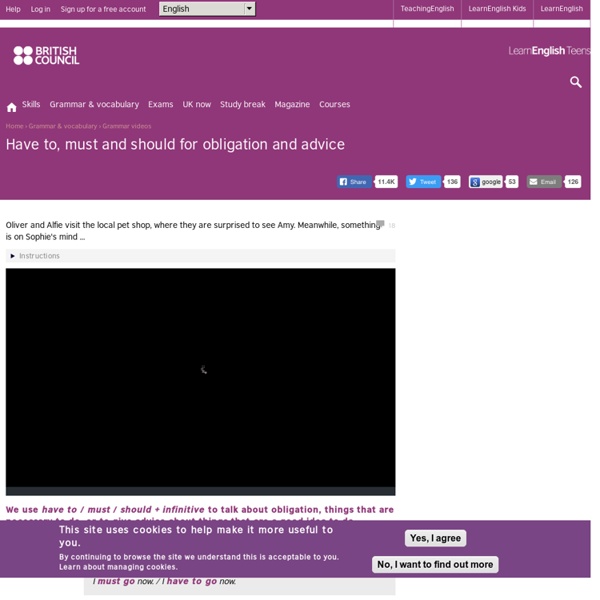The present continuous
We use the present continuous (am/is/are + -ing) to talk about temporary things which have begun but haven't finished. They are often happening now, at this moment. Here are some examples of things happening now. I'm just uploading some photos to Facebook and I'm sending a message to Billie. We're all riding camels and the sun's shining. They're waiting for me to get off the phone! I'm not sure what 'temporary' means. Yes, absolutely! OK, I see what you mean. Yes, I’m glad you asked me that. At eight I’m meeting Lucas, just for a quick coffee. What about questions and negatives? For questions you just change round the subject and the verb to be. Are you working hard for the exam? For negatives you add not after the verb to be. You're not really studying at all, are you? That's fine, but I suppose there are some spelling rules for –ing forms? Yes, you're right. have - having ride - riding If a verb ends in a vowel + a consonant, the consonant is usually doubled before you add –ing. Whoops!
British Council | Christmas Scene 1
Ashlie: Oh hi, Stephen. You made it then! Stephen: Hi, Ashlie, I thought we were going Christmas shopping, not ice-skating. Ashlie: Oh, we are. But I saw the rink and ice-skating is so much fun. It’s almost as much fun as shopping! Stephen: It’s Christmas Eve and this is the Tower of London Ice Rink. Ashlie: We’re cooking dinner for the family this year. Stephen: And we’ve still got lots of presents to buy. Ashlie: Oh come on, Stephen. Stephen: Stop showing off. Ashlie: Come on then. Stephen: It’s not as difficult as it looks. Ashlie: Stephen, you’re going in the wrong direction. Ashlie: Stephen! Stephen: Oh, sorry! Stephen: Oh, I love Christmas, Ash. Ashlie: I know. Stephen: Wow, look at these. Ashlie: Well, maybe we could get something for the tree. Stephen: Those are really boring. Ashlie: Mmm, well, I’m not sure. Stephen: No way! Ashlie: Well, I suppose so. Stephen: Presents - of course. Ashlie: Bye! Stephen: There... perfect! Ashlie: Stephen! Ashlie: No, I really don’t. Stephen: OK.
Future forms
We have different ways of talking about the future. We often use going to (+ infinitive), the present continuous (to be + -ing) or will (+ infinitive). The structure we use depends on the function of what we want to say, whether we are talking about arrangements, plans, predictions, etc. I thought will was the future tense in English. It’s one of the ways of talking about the future, but there are a few others. Oliver’ll be back soon. We also use will when we decide something at the moment of speaking. (The doorbell rings) I’ll get it. So, you sometimes use the verb think before will? Yes, that’s very common. I’m sure you’ll have a good time. You said will is used for decisions made at the moment of speaking. Then we can use either the present continuous or going to (+ infinitive). Amy’s coming round. Is there a difference between them? We use the present continuous more for arrangements with other people and be + going to + infinitive for intentions. Yes, that’s correct. No. Look out! Yes.
History of Halloween - Halloween
When Is Halloween 2023? Halloween is celebrated each year on October 31. Halloween 2023 will take place on Tuesday, October 31. Ancient Origins of Halloween Halloween’s origins date back to the ancient Celtic festival of Samhain (pronounced sow-in). This day marked the end of summer and the harvest and the beginning of the dark, cold winter, a time of year that was often associated with human death. Haunted History of Halloween In addition to causing trouble and damaging crops, Celts thought that the presence of the otherworldly spirits made it easier for the Druids, or Celtic priests, to make predictions about the future. To commemorate the event, Druids built huge sacred bonfires, where the people gathered to burn crops and animals as sacrifices to the Celtic deities. When the celebration was over, they re-lit their hearth fires, which they had extinguished earlier that evening, from the sacred bonfire to help protect them during the coming winter. Did you know? All Saints' Day
Present continuous and the Going to form-English
> BEST RESOURCES: PLACEMENT TEST | GUIDE | OUR BEST WORKSHEETS | Most popular | Contact us > LESSONS AND TESTS: -ing | AS or LIKE | Abbreviations and acronyms... | Adjectives | Adverbs | Agreement/Disagreement | Alphabet | Animals | Articles | Audio test | Be | BE, HAVE, DO, DID, WAS... | Banks, money | Beginners | Betty's adventures | Bilingual dialogues | Business | Buying in a shop | Capital letters | Cars | Celebrations: Thanksgiving, new year... | Clothes | Colours/Colors | Comparisons | Compound words | Conditional and hypothesis | Conjunctions | Contractions | Countries and nationalities | Dates, days, months, seasons | Dictation | Direct/Indirect speech | Diseases | Exclamative sentences! > ABOUT THIS SITE: Copyright Laurent Camus - Learn more / Help / Contact [Terms of use] [Safety tips] | Do not copy or translate - site protected by an international copyright | Cookies. | Our English lessons and tests are 100% free but visitors must pay for Internet access.



